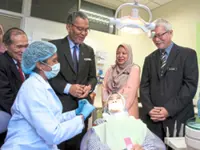PETALING JAYA: The government must be open to considering setting up a national health insurance scheme, say experts.
Under such a scheme, people would have the choice of going to a public or private healthcare provider, thus relieving the burden on public hospitals and clinics, said Prof Dr Sharifa Ezat Wan Puteh of Universiti Kebangsaan Malaysia when contacted on Wednesday (June 14).
Already a subscriber? Log in
The Star Festive Promo: Get 35% OFF Digital Access
Cancel anytime. Ad-free. Unlimited access with perks.
Follow us on our official WhatsApp channel for breaking news alerts and key updates!
Thank you for your report!





